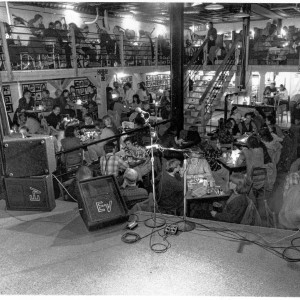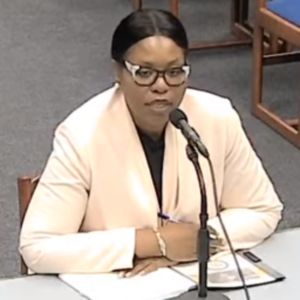Columnist Olin Rose-Bardawil: ‘Corporate capture’ a grave threat to citizens

Olin Rose-Bardawil STAFF PHOTO/CAROL LOLLIS
| Published: 04-11-2024 5:11 PM |
In light of recent debates over whether the U.S. should continue providing military aid to Israel, I have been thinking a lot about the dangers of the U.S. military’s entanglement with multibillion-dollar defense contractors.
This entanglement, known as the military-industrial complex, is a well-documented phenomenon. When you have numerous corporate giants that profit off war, it should come as no surprise that the U.S. involves itself in foreign wars again and again, even when a majority of Americans are opposed to our participation in these conflicts.
Before leaving office, President Dwight D. Eisenhower warned Americans about the danger of this phenomenon. “In the councils of government, we must guard against the acquisition of unwarranted influence by the military industrial complex,” said Eisenhower, who first coined the term.
While Eisenhower was specifically warning against military corruption in his address, his message is applicable to another form of government entanglement — one that is just as pernicious — known as “corporate capture.”
Also known as “regulatory capture,” corporate capture is the infiltration of federal agencies by the industries those agencies are put in place to regulate.
This phenomenon was first observed by economist George Stigler, who framed it as “the problem of … why an industry is able to use the state for its purposes.” Stigler, a staunch libertarian, used the idea of corporate capture to suggest that any attempts to regulate the economy would ultimately result in corruption.
While I do not agree with Stigler’s total dismissal of government regulation, I believe he is right when it comes to the way in which many agencies operate — by propping up the industries they are supposed to mediate, rendering them powerless to keep companies from causing harm.
Corporate capture was epitomized during the Trump administration. Take, for instance, Trump’s appointment of Scott Pruitt as head of the EPA. Pruitt’s position is that oil companies should be given free rein. This explains why oil companies collectively raised half a million dollars to support his appointment.
Article continues after...
Yesterday's Most Read Articles
 The Iron Horse rides again: The storied Northampton club will reopen at last, May 15
The Iron Horse rides again: The storied Northampton club will reopen at last, May 15
 Homeless camp in Northampton ordered to disperse
Homeless camp in Northampton ordered to disperse
 Authorities ID victim in Greenfield slaying
Authorities ID victim in Greenfield slaying
 $100,000 theft: Granby Police seek help in ID’ing 3 who used dump truck to steal cash from ATM
$100,000 theft: Granby Police seek help in ID’ing 3 who used dump truck to steal cash from ATM
 UMass football: Spring Game closes one chapter for Minutemen, 2024 season fast approaching
UMass football: Spring Game closes one chapter for Minutemen, 2024 season fast approaching
 Final pick for Amherst regional superintendent, from Virgin Islands, aims to ‘lead with love’
Final pick for Amherst regional superintendent, from Virgin Islands, aims to ‘lead with love’
Corporate capture is by no means limited to the Trump administration, though. The FDA administrator under both presidents Obama and Biden, Robert Califf, was previously the director of Portola Pharmaceuticals and is now on the board of several other pharmaceutical companies. Additionally, he continues to have millions of dollars invested in pharmaceutical stocks while he serves as the head of the FDA.
Some may claim that corporate involvement in agencies isn’t such a bad thing, as it allows for companies like vaccine developers, for example, to innovate with the assistance of the government.
But how can we trust agencies to hold polluters accountable and keep harmful products off the market when some of the people who run them used to work for the culprits?
We can’t. And the past few decades have been proof of that. The 2023 train derailment in East Palestine, Ohio, which spewed 115,000 gallons of toxins into the atmosphere, was a direct failure on the part of the Department of Transportation. Norfolk Southern, the company responsible for the disaster, received tens of millions of dollars in DOT grants leading up to the derailment.
Three out of four East Palestine residents have since reported new health issues, and high levels of dioxin, a cancer-causing compound, are still present in nearby soil. Events like these are highly avoidable but continue to occur because too many regulators have abandoned their duty to protect Americans.
So, how do we deal with these issues? How can we ensure that government agencies have the interests of the American public, and not of billion-dollar corporations? Obviously, there is no simple fix to such a widespread issue.
We have to start with citizen accountability. A primary reason that corruption in bureaucratic agencies is allowed to continue is because those running them believe no one is paying attention to what they do. As people start to pay attention, though, it will have an impact on how these agencies operate.
Some members of Congress have woken up to the stranglehold corporations have on the regulatory system. A few years ago, Rep. Pramila Jayapal, D-Wash., introduced the Stop Corporate Capture Act, which would “reduce corporate influence on the rule-making process,” according to the bill. In an op-ed that appeared in The Hill, regulator policy experts Matthew Kent and Amit Narang dubbed the bill “the most important legislation you’ve never heard of.”
Sadly, many companies, when left unchecked, are willing to harm the American people if it helps them turn a profit.
We must act. Otherwise, the problem of corporate capture will continue, and our executive agencies will retain no resemblance to what they were created to be. As Eisenhower so accurately predicted, the potential “for the disastrous rise of misplaced power exists and will persist” within government. So, he said, “we should take nothing for granted.”
Olin Rose-Bardawil of Florence is a new columnist whose writings from a youth perspective appear monthly in the Gazette. He is a student at the Williston Northampton School and the editor in chief of the school’s newspaper, The Willistonian.

 Guest columnist John Sinton: ‘In tears for both Jew and Palestinian’
Guest columnist John Sinton: ‘In tears for both Jew and Palestinian’ Sidney Moss: Trial showing that no one is above the law
Sidney Moss: Trial showing that no one is above the law Steve Smith: Rose for Worthington Selectboard
Steve Smith: Rose for Worthington Selectboard Araceli Katalin McCoy: Why we should change the voting age to 16
Araceli Katalin McCoy: Why we should change the voting age to 16
